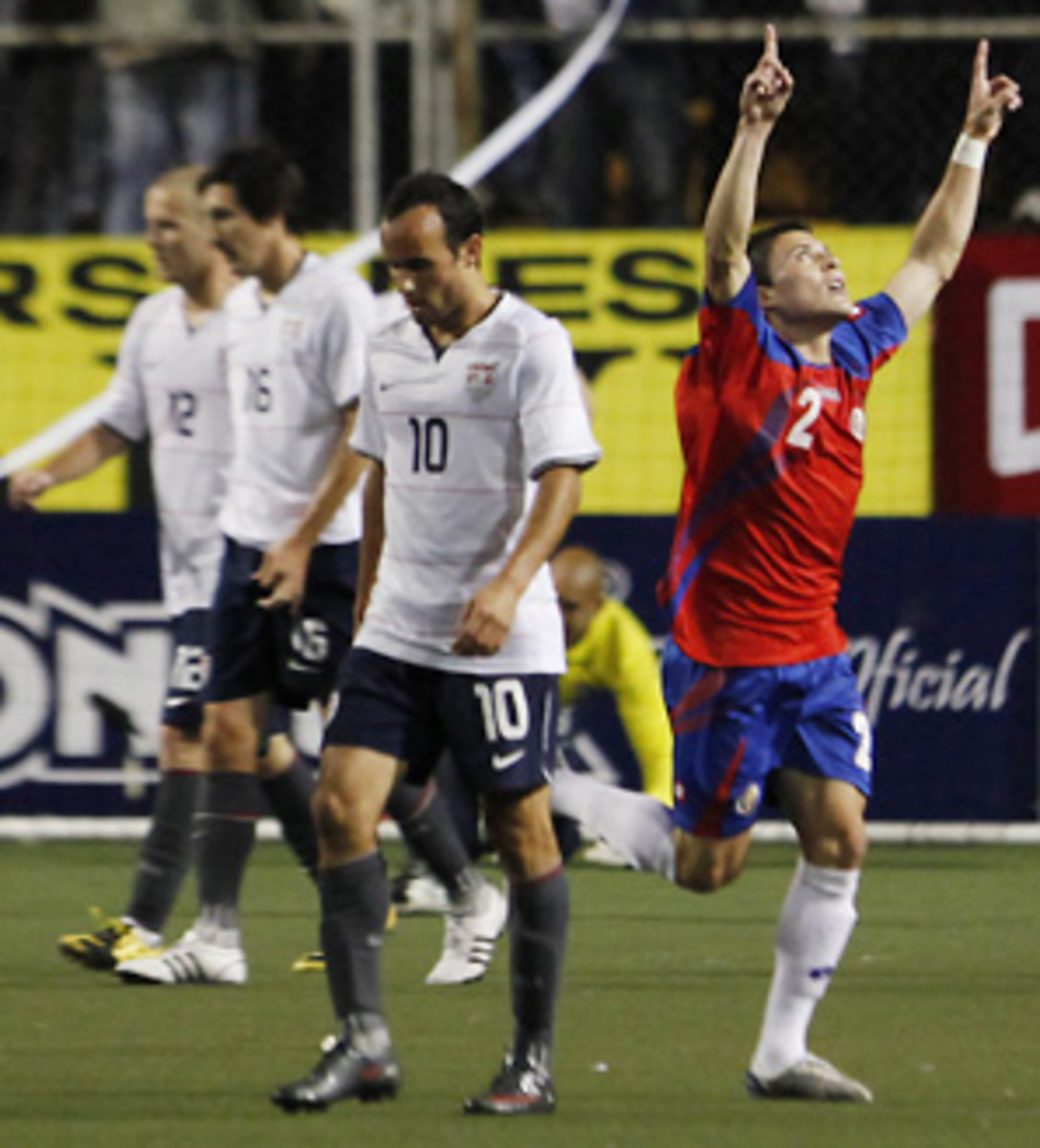U.S. must rebound vs. Honduras after debacle in Costa Rica
As their defense continued to get shredded, they conceded another before halftime and, as the final minutes ticked off the clock, they were staring at a highly embarrassing, totally demoralizing three-goal deficit to a team they felt they should have beaten.
The funny thing is, this isn't just the game summary from the U.S. national team's 3-1 drubbing on Wednesday in San José, Costa Rica. It's almost the exact script from the last time a full-strength U.S. squad lost this badly: a disastrous 3-0 defeat to the Czech Republic at the 2006 World Cup in Germany.
Let's be fair: The stakes right now are not as high as they were that day in Gelsenkirchen. The next World Cup is 12 months away. The U.S. still has six games to play in this final CONCACAF qualification campaign and there's no reason to think it won't book a berth at South Africa 2010, which would be its sixth straight World Cup.
But for the first time since Bob Bradley inherited the head coaching duties from Bruce Arena after the debacle of '06, the U.S. is licking its wounds and in dire need of a rebound result after getting comprehensively taken apart. Following a game in which not one American really impressed in any way, the team's depth and preparedness are coming into question, as is the way it responds when an opponent seemingly has all the answers on how to shut down the top nation in CONCACAF.
"We need to learn from tonight," Landon Donovan said Wednesday after the Costa Rica loss, "but the most important thing is getting over it as quickly as possible and taking what you can from it."
Redemption for the Americans begins on Saturday at Solider Field against another highly motivated opponent in Honduras (8 p.m. ET, ESPN, Galavisión). That's no easy task. In house, Bradley's challenges are many.
For one, he'll have to keep juggling his lineup to deal with a suspension for Michael Bradley, plus injuries to Frankie Hejduk, Maurice Edu and Brian Ching. He'll have to figure out what to do with natural winger DaMarcus Beasley, who was abused by Costa Rica in his second game at left back, a position for which he isn't particularly suited. And he needs to restore confidence in youngsters Marvell Wynne and José Francisco Torres, both of whom were torched by Costa Rican attackers in their first games in the final round of qualifying.
Then there's the matter of those guys on the other side of the ball. Though they don't boast a star-filled lineup, los Catrachos are much like Costa Rica: a skilled, fast and strong team. On a good night, they're as good as anyone the U.S. has faced in qualifying. When Mexico visited San Pedro Sula in April, Honduras administered a 3-1 beatdown that was eerily similar to the U.S. loss to Costa Rica on Wednesday.
"They're a physical team and they're athletic," Donovan said of Honduras. "They'll be motivated and I'm sure they watched the game [against Costa Rica] and they'll be ready to go."
The U.S. hasn't faced the Hondurans in nearly four years, but the hosts won't be strangers. Attacking terrors Ramón Núñez and Carlos Pavón both spent time in Major League Soccer and are familiar with many of their American opponents. Among Honduras' regulars are several players whose skills have been hardened in Europe, including midfielder Wilson Palacios, defender Maynor Figueroa and high-scoring attacker Carlo Costly.
But perhaps no name is as familiar -- or dangerous -- to the U.S. as irascible Honduras captain Amado Guevara. The 33-year-old Toronto FC attacking midfielder knows how to score on American opposition perhaps better than any player in CONCACAF. "El Lobo" has 41 goals over seven seasons in MLS and won the league's MVP award in '04 while playing for the MetroStars.
In all, Honduras is dangerous and hungry, chasing its second World Cup appearance (and first since 1982). That adds up to a formidable opponent the U.S. can't take lightly.
"They've had some ups and downs," Bradley said last week, "but if you look at their games throughout qualifying, there's a realization on their end that this is a great opportunity for them, that it comes at a point in all of their careers when they're all able to take advantage of where they are in their careers, the collective experience that they have and try to make a big push. We know what they're all about and we have great respect for them."
The loss on Wednesday was the Americans' first in the final Hexagonal round and dropped them to second place in the standings. Failure to get a result against Honduras could put them further behind the Costa Ricans. Worse, a defeat would leave them tied with the Hondurans, which would usher in crisis mode.
Of course, it's worth looking back three summers ago to the last time the U.S. faced a similar situation. After getting blown out by the Czechs, the Americans regrouped and put together one of their most heroic performances ever, holding eventual World Cup champion Italy to a bloody 1-1 draw.
Donovan & Co. probably won't have to work as hard as that to get a result on home turf on Saturday, despite the fact that half of Soldier Field likely will be cheering for Honduras. But how the U.S. responds to adversity, for the first time in the Bradley era, will tell us a lot about what this team is really made of.





